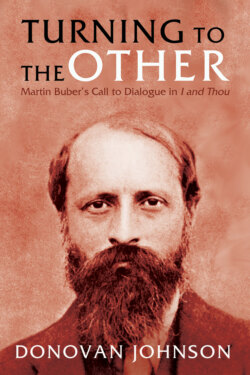Читать книгу Turning to the Other - Donovan D. Johnson - Страница 7
На сайте Литреса книга снята с продажи.
The Conventions Used in This Book
ОглавлениеI have kept translator Smith’s Thou rather than going with translator Kaufmann’s “You.” When I, Thou, or It is used as one of the technical terms in Buber’s discourse, I have used italics to distinguish such usage. Following Wood, one of Buber’s major interpreters, I have numbered the sixty-one sections of I and Thou and assigned a lowercase letter to each paragraph in sequence within each section. Accordingly, a parenthetical reference such as (§60d) uses a section symbol and refers to the fourth paragraph of section 60. This convention makes the location cited definitive regardless of whether one has Smith’s version, or Kaufmann’s, or the original German at hand. Most other material from Buber that is quoted comes from published English translations; exceptions—my translations and modifications are noted in the footnotes. Begegnung, one of the key words in Buber’s dialogical vocabulary, can be translated either as “encounter” or as “meeting.” Contra Maurice Friedman, when I translate this word I use the word “encounter.”
This book is a study of Martin Buber’s I and Thou. Quotations from the text of I and Thou are my translations from Buber’s original German unless otherwise noted. I have consulted the two published English translations of I and Thou in my work with the German text. It is worth noting the differences between these two translations.
The first, that by Ronald Gregor Smith, was published in 1937, fourteen years after Ich und Du was first published in Germany. Smith was a Scottish Protestant theologian who had studied and lived in Germany and he worked closely with Buber on this translation of Ich und Du. As Buber’s major early translator into English, Smith undertook translating a number of Buber’s major early works up until his untimely death in 1968 at the age of fifty-five. Smith’s precision as a twentieth-century British theologian brings a crispness to the language that first introduced I and Thou to the English-speaking world.
Walter Kaufmann, the second translator, was a German by birth and a Jew by conversion. Kaufmann migrated to the US for his undergraduate studies. He completed his career as a Professor of Philosophy at Princeton University. His primary allegiance was to the discipline of philosophy, which made him critical of Buber and Buber’s language at times. In 1969, Buber’s son Rafael invited Kaufmann to undertake a new translation of Ich und Du into English. Kaufmann’s native German served him well for this task, largely because of his ease with literally translating Buber’s phrasing. Kaufmann chose to use capitalized “You” and “It” rather than Smith’s italicized “Thou” and “It.”
